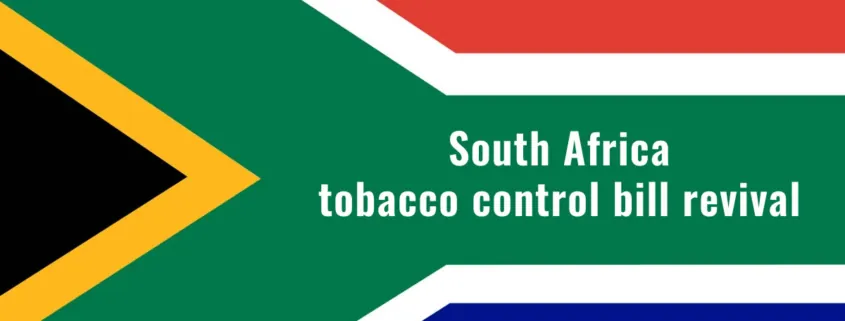South Africa Revives Stringent Tobacco Control Bill
South Africa’s Parliament has revived the Control of Tobacco Products and Electronic Delivery Systems Bill, a piece of legislation that aims to impose stricter regulations on the sale, advertising, and use of tobacco products and electronic delivery systems. The Bill, which lapsed at the end of the previous administration, now sits in Parliament and is on the agenda of the seventh administration.
Aligning with WHO Framework Convention on Tobacco Control
The Bill seeks to strengthen public health protection measures by aligning South Africa’s tobacco control legislation with the World Health Organisation (WHO) Framework Convention on Tobacco Control. It proposes a range of measures, including:
- Imposing stricter product and related product processing, manufacturing, and import standards
- Regulating tobacco product and electronic delivery system advertising
- Standardizing the packaging and appearance of tobacco and electronic delivery system products
- Prohibiting smoking in all indoor public places and certain outdoor areas
- Banning cigarette vending machines
- Mandating plain packaging with graphic health warnings and pictorials
- Banning the display of tobacco products and electronic delivery systems at points-of-sale
Reactions to the Bill’s Revival
The revival of the Bill has sparked mixed reactions from various stakeholders. Dr. Sharon Nyatsanza of the National Council Against Smoking (NCAS) praised the legislation as a significant step towards promoting a healthier society. She emphasized that strong tobacco control policy is central to reducing South Africa’s heavy burden of non-communicable diseases and will support the sustainable implementation of the National Health Insurance.
Dr. Catherine Egbe, lead investigator of the Global Adult Tobacco Survey-South Africa (GATS-SA), highlighted the urgent need to pass the Bill, citing the high prevalence of tobacco usage across the country. GATS-SA indicates that 29.4% of those aged 15 years and up—equating to 12.7 million people—use tobacco, exposing themselves to severe health risks.
Lesego Mateme, a youth advocate from the South African Tobacco-Free Youth Forum, expressed concern about the rise of e-cigarette usage among youth, attributing it to the aggressive marketing tactics of the tobacco and e-cigarette industries.
Concerns and Challenges
Despite the Bill’s health-related objectives garnering widespread in-principle support, numerous pressing concerns were raised during the public hearings held by the previous Parliament’s National Assembly Health Committee. These concerns include:
- Possible job losses in the industry should manufacturers downsize due to more onerous and costly regulatory requirements
- The consequential likelihood of increased trade in illicit tobacco products
- A possible reduction in tax revenue from the production and sale of legal tobacco products and electronic delivery systems
- Inadequate attention to the Bill’s implications for small and informal traders, especially those selling single cigarettes
- Inadequate attention to the Bill’s implications for tobacco farmers, particularly small-scale and emerging farmers
- Inadequate monitoring and enforcement capacity
Economic Impact and Illicit Trade
According to Statista, revenue from the legal cigarettes market in South Africa will amount to an estimated R268 billion in 2024. While the cigarette market remains prevalent, its illicit trade has boomed, and those against the Bill believe that such legislation could fuel even further growth.
A recent study by Nicole Vellios and Corné van Walbeek from the Research Unit on the Economics of Excisable Products at the University of Cape Town revealed that the South African government lost an estimated R119 billion in excise and Value-Added Tax (VAT) revenue between 2002 and 2022 due to the country’s sprawling illicit cigarette market. In 2022 alone, R15 billion was lost in excise revenue, and R3 billion in VAT revenue.
The Way Forward
As the Bill moves forward in Parliament, it remains to be seen how the new National Assembly Health Committee will proceed. Calls have been made for the Bill to be sent to the National Economic Development and Labour Council for more robust consultation, and it appears that no socio-economic impact assessment was ever conducted.
The debate surrounding the Control of Tobacco Products and Electronic Delivery Systems Bill highlights the complex interplay between public health concerns, economic considerations, and the need for comprehensive stakeholder engagement. As South Africa navigates this legislative process, finding a balance between promoting a healthier society and addressing the practical challenges posed by the Bill will be crucial.
News source: New smoking laws for South Africa are back
- Is It Illegal to Vape or Smoke While Driving in Massachusetts? - August 5, 2025
- Austria Plans to Ban Disposable E-Cigarettes - August 5, 2025
- Vaping vs. THC Drinks: Which Cannabis Option Is Right for You? - August 4, 2025








